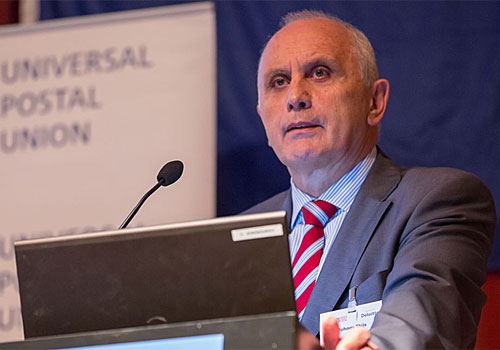
UPU warns: “Internet does not fulfill every need” for Posts
The Universal Postal Union has urged postal operators around the world not to be distracted from the main business of delivering mail and parcels by pressures to diversify into new digital services. Ahead of its next four-yearly Congress, to be held in Doha from later this month, the UPU said at its World Postal Business Forum in Brussels today that innovation was “vital” to reviving the postal sector’s fortunes.
But outgoing UPU director-general Edouard Dayan issued a note of caution to the many posts currently diversifying their service portfolios.
“The development of the digital economy has stimulated the need for Posts to expand their product and service offerings by developing postal digital services,” he said.
“The UPU is ever-conscious that the Internet does not fulfill every need. Mail and parcels are still the core business of the majority of Posts.”
Dayan steps down as UPU director-general at the end of this year after eight years, having reached the end of his term limit. An election to choose his successor takes place in Doha on 10th October.
.post
The UPU – a UN-affiliated organisation that represents 192 nations around the world regarding national postal services – is itself set to launch the next step of its own major digital mail project at this year’s Doha Congress.
The organisation has been developing a platform for a global system of digital postal mail delivery – a kind of email run by postal operators that is secure and free from spam – ever since it obtained the rights to the “.post” Internet sub-domain back in 2009.
The UPU has said it wants the .post platform to link the physical and digital delivery worlds, to provide a basis for e-services for governments and business, enabling applications that might include identity management, ecommerce, online payment, secure digital mailboxes, address management and hybrid mail.
Priority on the core

bpost chief executive Johnny Thijs said his company was focussing on the core delivery business
But the UPU said today that its three-day World Postal Business Forum was highlighting the importance of postal operators’ core business areas.
Johnny Thijs, the chief executive of Belgium’s bpost, said his company would not embrace the digital world because it did not see a business case for it.
“Our ambition is limited to the core business, where we use our competencies,” he said, adding that bpost was currently looking to move its focus more towards parcels.
Dato’ Khalid bin Abdol Rahman, the Pos Malaysia CEO, also stated a company strategy based on developing its core competencies.
He said his company was aiming to move from more of a product-focussed strategy to a more consumer-driven priority, and said efforts to diversify revenues were on full throttle since Pos Malaysia was taken over by the DRB-HICOM conglomerate last year.
“We can build on our core competencies. We have access to more than 80 per cent of addressed and unaddressed establishments and have one touch point for every 5,000 inhabitants in Malaysia,” Khalid said.













As an observation businesses owned and run by Governments are their own worst enemies holding rates down and destroying their own profitability